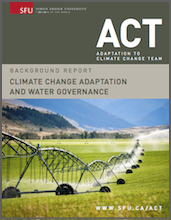Climate Change Adaptation and Water Governance: Background Report


Introduction
As climate change progresses, the hydrologic cycle will be significantly affected by regional shifts in temperature, precipitation and extreme weather events; indeed, impacts are already being observed and experienced across the country. These changes require adaptations in the way people manage water, because we can no longer base water management on historical climate data and the standard assumptions about day-to-day systematic demands.
Last year, the National Round Table on Environment and Economy released a report that said Canada’s water management approach is outdated, and highlighted climate change as one of the four most important water sustainability issues affecting our country, predicting that we will need to transform the way we manage water. Despite this growing awareness of the effects of climate change, Canada did not demonstrate leadership during international negotiations for a climate change deal at the 16th Conference of Parties in Cancun. This lack of leadership is a symptom of an ongoing lack of focus on climate change that caused concern for many Canadians who value our country’s role on the international stage as an environmental innovator. From unprecedented drought and wildfires in the Okanagan in 2009 to catastrophic flooding in Manitoba in 2010, from compromised water quality due to the oil sands to debates about trans-boundary allocations, Canadians are becoming increasingly aware of both the value and the vulnerability of our seemingly limitless supply of fresh water.
Fortunately, Canada is better positioned than many nations to address the challenges of a warming climate. Examples of water-related climate change adaptation are emerging in pockets across the country, such as these examples from federal, provincial, local and First Nations governments:
- Natural Resources Canada provided matching funding for four cross-Canada Regional Adaptation
- Collaboratives, all of which identified water as their top priority and are focused on actions to implement adaptation to water impacts;
- Environment Canada supported Dr. Stewart Cohen’s work on water adaptation in the Okanagan and has been integral to the development of many other water-related initiatives and important resources;
- BC’s modernization of The Water Act includes climate change as a key driver, as does the Northwest Territories’ new water strategy;
- Toronto includes water conservation within its climate change action plan; and
- The annual First Nations Mother Earth Water Walk, begun by Anishinabe grandmother Josephine Mandamin and others, is designed to bring attention to the combined threats of pollution and climate change to fresh water supplies.
The proliferation of water-related adaptations, acknowledging that climate change is a serious challenge, points to a growing understanding of the need to act and underscores the urgent need for leadership to coordinate these largely disparate efforts. In order to adequately prepare for the future and build a truly resilient country, it would be useful to establish over-arching goals for Canada along with strategic policy approaches that can help coordinate our efforts at all levels. We need to re-assess the values and challenges underpinning Canada’s current water management strategies and we need to consider ways that policy leaders can help us move forward in the most effective way through policy innovation.
The challenges facing water governance and management in Canada are many and varied, and climate change will exacerbate them all. However, Canadians are prepared to meet these challenges and we are hopeful that Canadians will find the courage to change our concept of water and its value in a way that will help us promote long-term sustainable well-being for our ecosystems, communities and industries. We need to act now, before the effects of climate change become a challenge on an order of magnitude with which we have difficulty coping, rather than one for which we are prepared.
In this report, Simon Fraser University’s Adaptation to Climate Change Team explores ways to effect adaptation in the form of planned water policy responses, designed to complement the equally important goals embodied in the drive to reduce emissions and promote sustainable development, while increasing the resilience of Canada’s natural, socio-economic and built environments.
This report represents the results of background research carried out from March 2010-June 2011, and acts asthe basis for the accompanying Summary Recommendations for decision-makers. This process included in-depth study and literature reviews by a team of graduate researchers drawn from the disciplines of Resource and Environmental Management, Planning, Earth Sciences and Public Policy, guidance and insights from lead policy author Bob Sandford, policy advice from ACT’s Board, and consultation with all orders of government, industry, NGOs, experts and communities through roundtables in three regions.
See other briefing papers from the Adaptation to Climate Change Team
(0) Comments
There is no content